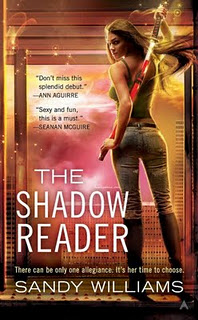
Book Review: The Shadow Reader by Sandy Williams
Written by: Beth Woodward, CC2K Books Editor
 I first heard of Sandy Williams’ novel, The Shadow Reader, a few months back, when the Facebook powers-that-be suggested I “Like” her. (Who decides such things? Is there a consortium at Facebook that says “If user Beth Woodward likes X, then she will also likely like Y?”) At any rate, it was a good suggestion, as this urban fantasy debut was right up my alley: a young woman who reads “shadows” for the Fae Court gets kidnapped by rebels and begins to see that things aren’t so black-and-white at all. Intrigue, romance, and moral ambiguity…what’s not to like?
I first heard of Sandy Williams’ novel, The Shadow Reader, a few months back, when the Facebook powers-that-be suggested I “Like” her. (Who decides such things? Is there a consortium at Facebook that says “If user Beth Woodward likes X, then she will also likely like Y?”) At any rate, it was a good suggestion, as this urban fantasy debut was right up my alley: a young woman who reads “shadows” for the Fae Court gets kidnapped by rebels and begins to see that things aren’t so black-and-white at all. Intrigue, romance, and moral ambiguity…what’s not to like?
The description, courtesy of Sandy Williams’ website:
There can only be one allegiance. It’s her time to choose.
Some humans can see the fae. McKenzie Lewis can track them, reading the shadows they leave behind. But some shadows lead to danger. Others lead to lies.
A Houston college student trying to finish her degree, McKenzie has been working for the fae king for years, tracking vicious rebels who would claim the Realm. Her job isn’t her only secret. For just as long, she’s been in love with Kyol, the king’s sword-master—and relationships between humans and fae are forbidden.
But any hope for a normal life is shattered when she’s captured by Aren, the fierce and uncompromising rebel leader. He teaches her the forbidden fae language and tells her dark truths about the Court, all to persuade her to turn against the king. Time is running out, and as the fight starts to claim human lives, McKenzie has no choice but to decide once and for all whom to trust and where she ultimately stands in the face of a cataclysmic civil war.
I liked McKenzie as a heroine. She’s strong, but also vulnerable. She’s been reading shadows for the court fae since she was a teenager, so her perspective is very much “Court fae = good, rebel fae = bad.” (This seemed, at first, a little naïve to me, but when McKenzie recalls a horrific experience she had at the hands of a rebel fae, it makes more sense.) She wants desperately to “retire,” to leave the fae world behind and live a normal life. But she’s a valuable commodity to them. Then there’s also the fact that she’s in love with the Court’s sword-master, Kyol. But Kyol is loyal to the king, who forbids relationships between human and fae.
McKenzie’s world comes apart when she’s kidnapped by Aren, the rebel leader. I think my favorite thing about this book is the way McKenzie slowly realizes that the fae’s world is not constructed in moral absolutes. There are no clear-cut good guys and bad guys—though initially, even after her perspective on the Court fae and the rebel fae start to change after her kidnapping, she tries to fit them into those categories. Much of McKenzie’s growth as a character comes from her dawning realization that things aren’t as simple as she imagined.
A lot of the “Court fae versus rebel fae” dilemma is also tied in to McKenzie’s feelings toward the two male leads in the novel, Kyol and Aren. We see a lot of her relationship with Kyol through flashbacks. He’s principled and self-controlled, acutely conscious of both McKenzie’s youth and her humanity. Aren, on the other hand, seems to be almost Kyol’s opposite, especially in the way he treats McKenzie: hot-blooded, and willing to pursue her despite the objections of his people.
I also loved that the book started right in the middle of the action, as McKenzie’s kidnapping is going down. I wrote about this a few weeks ago: I, personally, prefer that books start in media res, allowing me to get into the story right away rather than being overwhelmed with characters and backstory. But this might be frustrating for some readers: the “who’s who” of McKenzie’s world comes out piecemeal later in the novel.
The one thing I would have wished for is that the romantic tension could have gone on longer. Without getting too spoilery, McKenzie does seem to make a choice—of both a romantic suitor and a side in the fae war—by the end of the novel. The choice of suitor seemed very sudden to me, as McKenzie had been very ambivalent on that front throughout the story. Plus, you lose the opportunity to see the love triangle evolve and develop in future books. (Though admittedly, this can be worked around.) That said, what it does do is provide a solid, strong ending to the story, which should be good news to the cliffhanger and loose-end averse. (I, personally, love both cliffhangers and loose ends. I think they heighten tension throughout a series. But that’s a personal bias of mine.)
Overall, I was in the “liked but didn’t love” camp for this novel. It’s a good debut with interesting characters and great world building, and I’ll be curious to see where Williams takes the storyline in the next book.
